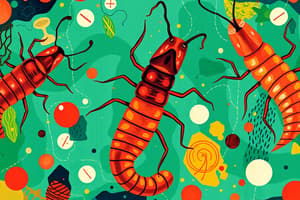Podcast
Questions and Answers
What is the primary function of anthelmintic drugs?
What is the primary function of anthelmintic drugs?
- To rid the body of worms (correct)
- To eradicate bacteria from the body
- To prevent allergic reactions
- To treat viral infections
How does mebendazole interfere with the survival of helminths?
How does mebendazole interfere with the survival of helminths?
- By blocking the metabolism of glycogen
- By inhibiting the formation of microtubules and reversibly blocking glucose uptake (correct)
- By enhancing the reproduction of helminths
- By increasing glucose uptake
Which of the following helminths is NOT targeted by mebendazole?
Which of the following helminths is NOT targeted by mebendazole?
- Ascaris lumbricoides (roundworm)
- Ancylostoma duodenale (common hookworm)
- Taenia saginata (beef tapeworm) (correct)
- Trichuris trichiura (whipworm)
What is the typical duration of GI clearance after mebendazole therapy?
What is the typical duration of GI clearance after mebendazole therapy?
What is a potential adverse effect of high-dose mebendazole therapy?
What is a potential adverse effect of high-dose mebendazole therapy?
What may occur in cases of massive infection with mebendazole therapy?
What may occur in cases of massive infection with mebendazole therapy?
What is the timeframe indicated for retreatment if the patient is not cured?
What is the timeframe indicated for retreatment if the patient is not cured?
Which of the following medications may reduce the serum concentrations of mebendazole?
Which of the following medications may reduce the serum concentrations of mebendazole?
What is the recommended laboratory test while taking albendazole?
What is the recommended laboratory test while taking albendazole?
What is the primary use of diethylcarbamazine citrate?
What is the primary use of diethylcarbamazine citrate?
What is the common side effect of diethylcarbamazine citrate in patients treated for W. bancrofti infection?
What is the common side effect of diethylcarbamazine citrate in patients treated for W. bancrofti infection?
What is the alternative treatment for onchocerciasis?
What is the alternative treatment for onchocerciasis?
Flashcards
Anthelmintics
Anthelmintics
Drugs used to eliminate parasitic worms (helminths) from the body.
Mebendazole (Vermox)
Mebendazole (Vermox)
Anthelmintic that interferes with worm reproduction by blocking glucose uptake and microtubule formation.
Mebendazole's Spectrum
Mebendazole's Spectrum
Treats various roundworm infections (nematodes).
Albendazole (Albenza)
Albendazole (Albenza)
Signup and view all the flashcards
Albendazole mechanism
Albendazole mechanism
Signup and view all the flashcards
Diethylcarbamazine (Hetrazan)
Diethylcarbamazine (Hetrazan)
Signup and view all the flashcards
Hetrazan's spectrum
Hetrazan's spectrum
Signup and view all the flashcards
Anthelmintic Precautions
Anthelmintic Precautions
Signup and view all the flashcards
Albendazole Absorption
Albendazole Absorption
Signup and view all the flashcards
Albendazole Liver Risk
Albendazole Liver Risk
Signup and view all the flashcards
Diethylcarbamazine Side Effects
Diethylcarbamazine Side Effects
Signup and view all the flashcards
Drug Interactions (Albendazole/Mebendazole)
Drug Interactions (Albendazole/Mebendazole)
Signup and view all the flashcards
Study Notes
Anthelmintics
- Anthelmintics are drugs used to rid the body of worms (helminths)
- They can act locally to rid the GI tract of worms or work systemically to eradicate worms that are invading organs or tissues
Mebendazole (Vermox)
- A synthetic benzimidazole-derivative anthelmintic
- Mechanism of action: interferes with reproduction and survival of helminths by inhibiting the formation of microtubules and reversibly blocking glucose uptake
- Spectrum of activity: active against various nematodes, including Ancylostoma duodenale, Ascaris lumbricoides, Capillaria philippinensis, Enterobius vermicularis, Necator americanus, and Trichuris trichiura
- Therapeutic uses: treatment of single or mixed infections with the listed helminths
- Precautions and monitoring effects: abdominal pain, nausea, and diarrhea associated with expulsion of organisms; myelosuppression can occur at high doses; significant interactions with carbamazepine and phenytoin
Albendazole (Albenza)
- A synthetic benzimidazole-derivative anthelmintic
- Mechanism of action: same as Mebendazole
- Spectrum of activity: active against Taenia solium and Echinococcus granulosus
- Therapeutic uses: treatment of parenchymal neurocysticercosis in combination with corticosteroids and cystic hydatid disease
- Precautions and monitoring effects: administer with a fatty meal for optimal absorption; hepatotoxicity occurs in 16% of patients; liver function tests every 2 weeks are recommended; rare cases of leukopenia, thrombocytopenia, granulocytopenia, pancytopenia, and agranulocytosis
Diethylcarbamazine citrate (Hetrazan)
- A synthetic organic compound highly specific for several common parasites
- Mechanism of action: highly specific for several common parasites
- Spectrum of activity: active against Wuchereria bancrofti, Onchocerca volvulus, Brugia malayi, Mansonella perstans, Mansonella ozzardi, Ascaris lumbricoides, and Loa loa
- Therapeutic uses: treatment of Bancroft's filariasis, onchocerciasis, ascariasis, and loiasis
- Precautions and monitoring effects: patients may present with headache and general malaise; severe allergic phenomena in conjunction with a skin rash have been reported; patients may experience pruritus, facial edema, and systemic symptoms secondary to the inflammatory response caused by pathogen death
Studying That Suits You
Use AI to generate personalized quizzes and flashcards to suit your learning preferences.
Description
Test your knowledge of anthelmintic drugs, their mechanisms of action, and specific agents like Mebendazole. Learn how they rid the body of worms and parasites, and understand their therapeutic effects.




